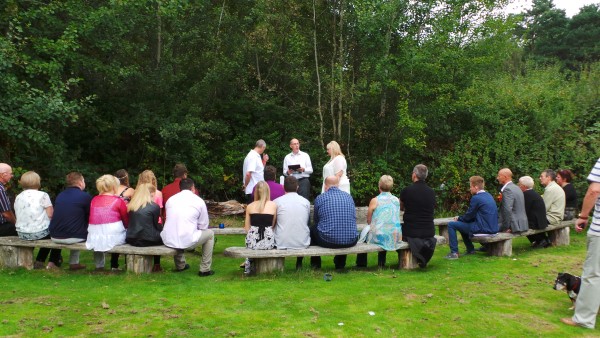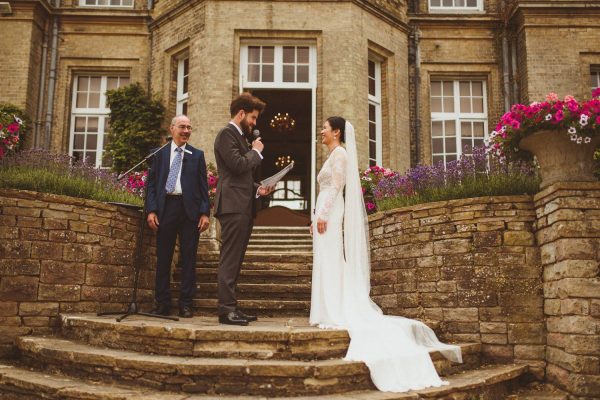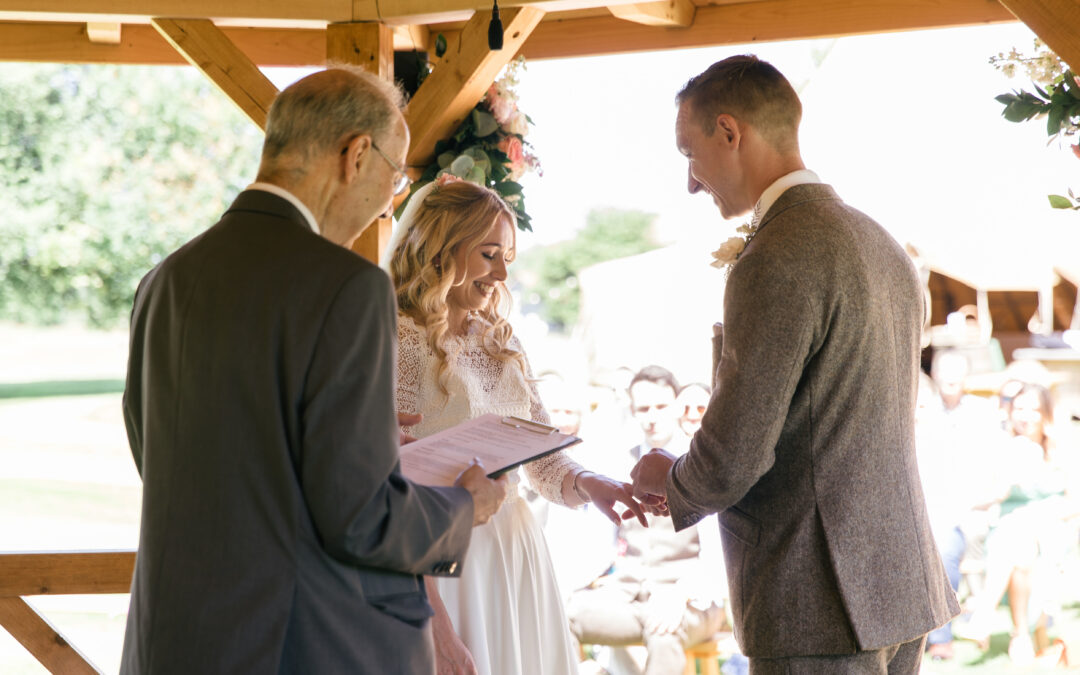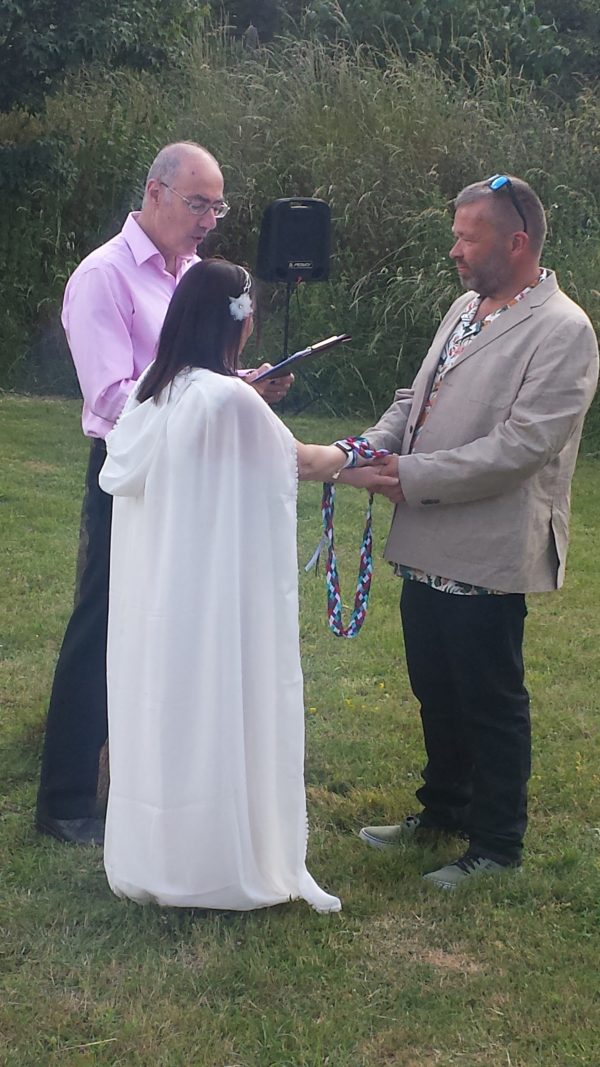
by Michael | Sep 11, 2023 | Blog
However you define it, we’ve reached Autumn now. The days are shorter, children are back at – or preparing for – school. We’re on the path towards the dark damp, cold days of Winter.
Sounds depressing, eh? Well, it needn’t be. Especially if you have something to look forward to. Personally, next Summer holds a big birthday for me as well as our silver wedding anniversary. So we’ve booked a special trip, and that prospect will help sustain us through the more miserable days of Winter.
However, you may not be in the same position as me, however. What can you do to bring some light to the forthcoming gloom?
It may not be such a crazy idea to plan and book a special ceremony for yourself. This could be a Vow Renewal or even a handfasting (or both!).
What this could mean is that you pick something that matters to you and mark it with an event. An example might be a wedding anniversary, especially one ending in -5 or -0. Or you might want to celebrate a new arrival into your family (this doesn’t necessarily have to be a baby). Perhaps somebody has recovered from serious ill health. Or it might be that somebody is starting a new job or moving away, and these could all merit a ceremony.
You might incorporate a ritual (or two) in your ceremony. (Your celebrant will be happy to advise you.) That way, if you want particular people to participate, they will be able to do so.
You can also include a favourite reading or two, and have input from folk special to you.
It won’t be like a wedding, where there is paperwork to complete and conditions to comply with. You can relax and do it just as you please. That might mean hiring a venue or doing it in your back garden. The possibilities are virtually endless.
The point is: you (and your celebrant) can put together a meaningful, beautiful ceremony that will hit the mark. This will be something you – and your guests – will really enjoy and remember far into the future.
So you can devote those dark days ahead to planning something worthwhile and unique.
Do have a chat, if this idea interests you.

by Michael | Mar 28, 2023 | Blog
Well, of course, you need to define what you consider luxury.
Cons
There aren’t really too many cons, in truth. The bottom line is that you can have a ceremony without a celebrant. If it’s a wedding, you can go down the Church or Register Office routes. They cover everything.
If a ceremony doesn’t need official documentation, technically anybody can conduct the ceremony. So you can ask a friend or relative to do so.
Therefore, technically, using a celebrant is indeed a luxury.
Pros
To despatch the second objection first, if you’re not using a professional celebrant, you may not get the ceremony you are hoping for. It may be difficult to design a suitable service without the guidance and ideas of a celebrant. Moreover, a celebrant knows how to present in public, and will do a lovely job. They will enhance the ceremony.
The first objection is a matter of choice.
You can opt for a religious ceremony (Church). You get the standard service and you know what you’re getting. It won’t be personalised, but that’s fine for some people.
The Register Office service is also standardised. It won’t really be personalised and, in contrast to the religious ceremony, it will be totally secular. You can’t mention God at all, for example. Most Registrars haven’t been trained to present with panache, so the service, which lasts about a quarter of an hour, is rarely particularly special. However, some couples are content with this.
Of course, until such time as the law changes (which should happen this summer), you need to use one of the two above options to comply with the law.
So, in that respect, using a civil celebrant would almost be duplication.
However, the professional services of a celebrant normally include the following:
- The chance to discuss your vision of your ceremony and build a unique service
- Advice and ideas based on (possibly) years of experience
- Respect for your input
- Numerous conversations/emails and drafts to get the order of service just right
- Help with the choreography of a big event
- A trained public speaker
- Professional pride and passion
One of my USPs is that I offer knowledge of languages (French, German, Russian, ability to read Hebrew and Czech), which has proved useful and popular.
Costs
Some celebrants’ package will cost over £1,000. Some will ask half that. (As I write, I’m somewhere in between.)
I would love the chance to make a real difference to your special day.Do contact me for a non-obligation chat.
People who use me are convinced that I am not a luxury!
Evidence
Let me finish with a quote from just one of my happy couples:
“From our first meeting with Michael we came away feeling very confident we would like to use him for our ceremony. His calming yet assertive demeanour put us at ease and we knew he would blend and adapt to what we had planned very well. Michael injected some fantastic ideas along with some beautiful readings and on the day there wasn’t a dry eye in the room. The whole process was very fluid and professional but always with a smile. We couldn’t recommend him enough.”
photo: Matt Penberthy

by Michael | Feb 27, 2023 | Blog
For many people, using a celebrant is a grey area. What exactly is a Civil Celebrant? What do they offer? Why use one at all?
The expected benefits
If you use a civil celebrant, you expect a friendly, professional service. You can count on them to offer sensible advice, make suggestions of ways to make your ceremony stand out. They should be attentive to your desires and seek to understand your vision.
They should listen to you and not necessarily impose their own ideas. They will work together with you as a well-informed friend, and aim at delivering the best service possible.
They should respond promptly to your enquiries or concerns and be pro-active, when needs be.
They should be good writers, able to put together that special ceremony in a special way.
On the day, they should arrive in good time and check that all is prepared. They put the main actors’ minds at rest. Then, they should deliver a fabulous ceremony!
The ‘added value’
The fact that the celebrant has experience, gained from training and from being ‘in the driving seat’, is invaluable. There’s no substitute for having been there and done it at such a major occasion.
The celebrant’s individual personality will fit certain couples better than others. You can match them up with your desires and needs.
This experience can also matter when planning the ceremony. The celebrant can suggest ideas that may chime with your vision or even advise what might not really work.
The celebrant should be able to present in public clearly and with feeling. They should also be able to relate to the couple (or whoever) as well as making the guests feel included.
Working with me
When you book me, we’ll be working together to come up with a unique, tailor-made ceremony that fits with your vision, beliefs and wishes. Your ideas and choices will be acknowledged and acted upon, so that the final version will have been totally approved by you. There won’t be any unpleasant surprises!
To have a chat about how it can work, please contact me.
Photo: samyaz.sproutstudio.com

by Michael | Dec 5, 2022 | Blog
There’s a lot of confusion about what a civil celebrant offers and, indeed, why you should use one. I’d like to clear things up now.
This does add to the mix, but we are awaiting a possible change in the law, due to be promulgated in July 2023. This could allow civil celebrants to conduct weddings that would be legally recognised. But for the moment we have to wait and see, so I shall proceed using the facts currently in place.
A lot of people mistake a civil celebrant for a registrar. Currently, couples have to be married by the registrars (or in certain religious venues such as C of E churches). This can be in the Register Office (with two witnesses) or at a licensed venue (but rules have changed somewhat for these recently).
The registrars are civil servants who are not necessarily trained in presenting professionally. They often conduct a standardised service that lasts around a quarter of an hour. It is purely secular (God – or even religious motifs – may not be mentioned).
You may wonder why it’s worth having a celebrant-led ceremony too, if you have to have a registrar-led one (even if the latter may not be very special).
The big advantage for many couples is that they want their wedding to be the biggest day of their lives. They may have a vision for the ceremony that the registrars simply cannot offer. A civil celebrant is independent and can therefore fulfil most needs. So you can have the ceremony of your dreams (in the place of your dreams).
The celebrant can provide religious elements (or none). You can include rituals that you want and involve the participants that you want. You may choose to mention “absent friends”. Do you want to write and recite your own vows? Not an issue. You can personalise the ceremony with your story (how you met, for example). The tone can be flexible (a mix of solemnity and humour, for example).
The point is that, with a civil celebrant, you can be sure of having a unique, personalised ceremony on your special day.
Michael would be glad to have a (non-obligation) call with you to discuss how he can help realise your vision.
Photo: Matt Penberthy

by Michael | Oct 18, 2022 | Blog
Unless you’ve actually been married already (and not necessarily even then!), you’ll make assumptions about weddings that aren’t necessarily true.
I’m going to take a few of these and set things straight.
Officiant
The registrar is not the only possible officiant. However, a marriage has got to be legally registered and, unless you marry under the auspices of certain religions (notably, C of E, Jewish or Quaker) which cover this, you’ll need to involve the Register Office.
You won’t necessarily need to go out to the Office. Registrars can come to your venue (depending on its compliance with certain stipulations) and conduct the ceremony there. The ceremony will be totally secular.
Apart from that, you have the option of a civil celebrant. (Currently – but this may change next July depending on the decision on the legislation reforms – civil celebrant ceremonies have no legal validity.) They are additional to Register Office services, offering the advantage of being fresh, even unique. They are certainly not standard and can reflect the couple’s beliefs and personalities.
Ceremony
With a civil celebrant, you have choice as to the type of ceremony you opt for. It can be quite wacky – but doesn’t have to be so. It can be relatively conventional. It can be part or wholly religious. So don’t go thinking that celebrant ceremonies have to be woo-woo!
But they can be, of course.
Cost
Everyone assumes that you need to take out a couple of mortgages to finance a wedding. Indeed, that may be the case, if you think too big. However, there are ways to reduce costs (eg making your ceremony off-peak, operating a cash bar, etc.).
But the point is that this should be a unique, unforgettable day, and that it really is worth pushing the boat out this once. You can’t put a price on memories.
Pressure on Couples
Your wedding may be subsidised or even paid for by others; that doesn’t mean that someone else should dictate what goes in, or stays out of, the agenda. It’s your big day, and that fact should be respected..
If pressure is being applied regarding the ceremony, remember that your officiant will be there for you and will support you.
So I hope these canards have been laid to rest. If I can help disperse any other misconceptions, don’t hesitate to ask.




